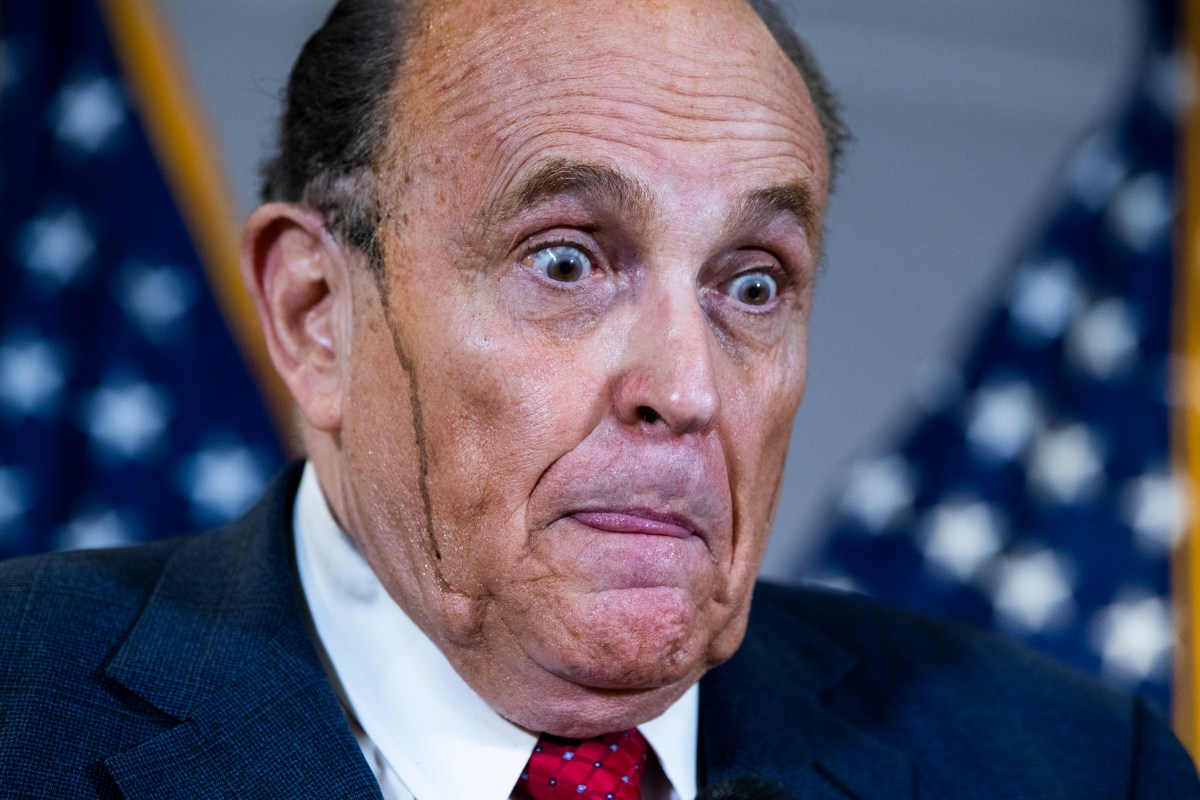Let the record reflect that Monday marked the day Rudolph W. L. Giuliani completed his historical metamorphosis from “America’s Mayor” to Otis, the town drunk. Giuliani (who did not appear at yesterday’s hearing) became furring at this second public hearing of the January 6 Committee—a kind of comic motif of the Capitol tragedy, popping up with absurd claims at key moments when others around Donald Trump were attempting to steer him toward some semblance of sanity.
We first meet Giuliani on Election Night at the White House, proposing to Trump, well before any contested states had been counted (and against the uniform advice of his campaign aides), that he simply go out and declare victory. Trump, as we know, went with the Giuliani Plan a few hours later. The only question lurking over that moment, the committee learned on Monday, was not whether Giuliani was drunk but how drunk he was. “I think the mayor was definitely intoxicated,” Trump’s former campaign spokesperson Jason Miller told the committee in videotaped testimony, “but I do not know his level of intoxication when he spoke with the president, for example.” In the early hours of November 4, Trump announced that, “frankly, we did win this election.”
Within a week, witnesses testified, Giuliani had displaced the existing campaign legal team and steered the president in search of a way to undo Joe Biden’s victory. Representative Zoe Lofgren, who conducted the Monday hearing after opening statements by Chair Bennie Thompson and Vice Chair Liz Cheney, quoted U.S. District Judge David Carter’s summary of this effort: “a coup in search of a legal theory.” Giuliani was soon assuring the January 6 Committee that every bogus rumor and conspiracy theory was definitely true, and there had been massive fraud: “If you gave me the paper ballots, I could probably turn this around.” Byung Jin Pak, who was at that point the Trump-appointed U.S. attorney for the Northern District of Georgia, told the committee yesterday in live testimony that Attorney General William Barr asked him to investigate a video proffered by Giuliani that purported to show an election worker sneaking a suitcase full of fraudulent ballots into an Atlanta counting site. “Unfortunately, in that Senate hearing, Mr. Giuliani only played a clip that showed them pulling out the official lockbox from under the table and referring to that as the smoking gun fraud in Fulton County,” where Atlanta is, Pak said. After viewing the whole video and sending FBI agents to interview those pictured, Pak said, he concluded that “the allegations made by Mr. Giuliani were false.”
After the election, Giuliani told a legislative committee in Pennsylvania that 8,000 dead people had voted in Pennsylvania. “Probably easier for dead people to submit mail-in ballots than it is to vote in person,” he joked. Philadelphia City Commissioner Al Schmidt, who had investigated that claim, told the January 6 Committee, “Not only was there no evidence of 8,000 voters voting in Philadelphia, there wasn’t evidence of eight.” Discussing that testimony, former Trump campaign lawyer Eric Herschmann on video dryly, if a bit confusingly, seemed to question Giuliani’s “ability to manage things at this level—or not.”
As the sun sets slowly on America’s Mayor, it is important to understand how apparently impaired he was when he captured Trump’s ear and began the process of deranging a quarter of the nation and an entire TV network. It’s not simply a pathetic spectacle; it is evidence of a defeated president who could only find clowns like Giuliani to tell him what he wanted to hear. The main thrust of the Monday hearing was to construct a tense, surreal ticktock of who told Trump that he had lost. The answer is pretty much everybody—not just Pak (and his successor, another Trump appointee), but also the Trump campaign manager Bill Stepien, Attorney General Bill Barr, the Justice Department lawyers Jeffrey Rosen and Richard Donohue, and 61 federal judges, 10 of them Trump’s own appointees.
No matter what happened, Trump insisted that the election had been swung by fraud. And why wouldn’t he? In 2012, he claimed that Barack Obama, who defeated Mitt Romney by 5 million votes, had only won by fraud. In 2016, he claimed that Ted Cruz cheated him in the Iowa Republican caucus. In April 2020, he began claiming that the November presidential election would be rigged. (Trump even once claimed that vote fraud cost him an Emmy for The Apprentice.)
This persistent, obsessive denial of reality might convince an onlooker that the individual in question is simply insane, incapable of understanding the world around him. But at the hearing’s end, the committee brought forward a potential second, entirely rational, reason: money. The “stolen election” narrative proved lucrative for Trump’s operation. Lofgren reported that Trump’s mail and email operation raised $250 million from donors who believed his tale of having been robbed. A lot of this money didn’t go to fight the nonexistent “steal”—it went (among other places) to the Trump Hotel Collection. “The Big Lie was also a big rip-off,” Lofgren said.
Even though by every legal estimate, any chance to challenge the election had passed on December 14, Lofgren said, the fund-raising emails continued to go out—right up until the morning of January 6. “Thirty minutes after the last email was sent,” Lofgren noted, “the Capitol was breached.”



